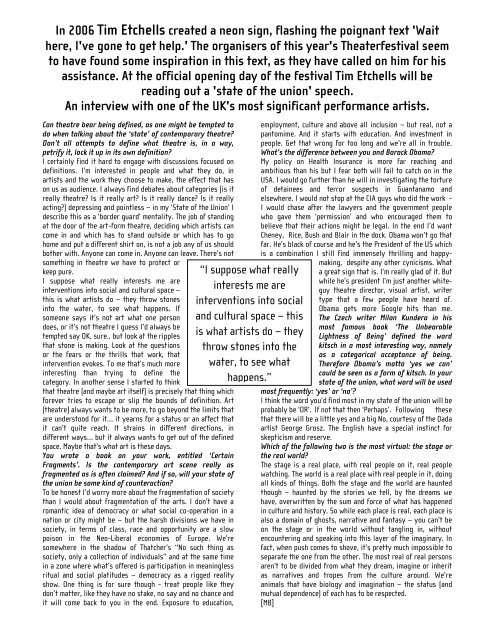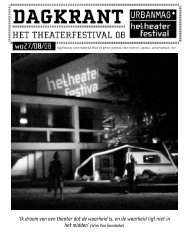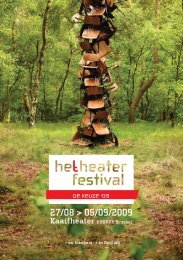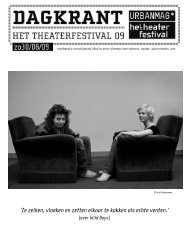The stage is a real place, with real people on it, real people watching.
The stage is a real place, with real people on it, real people watching.
The stage is a real place, with real people on it, real people watching.
Create successful ePaper yourself
Turn your PDF publications into a flip-book with our unique Google optimized e-Paper software.
In 2006 Tim Etchells created a ne<strong>on</strong> sign, flashing the poignant text 'Wa<strong>it</strong><br />
here, I've g<strong>on</strong>e to get help.' <str<strong>on</strong>g>The</str<strong>on</strong>g> organ<str<strong>on</strong>g>is</str<strong>on</strong>g>ers of th<str<strong>on</strong>g>is</str<strong>on</strong>g> year's <str<strong>on</strong>g>The</str<strong>on</strong>g>aterfestival seem<br />
to have found some inspirati<strong>on</strong> in th<str<strong>on</strong>g>is</str<strong>on</strong>g> text, as they have called <strong>on</strong> him for h<str<strong>on</strong>g>is</str<strong>on</strong>g><br />
ass<str<strong>on</strong>g>is</str<strong>on</strong>g>tance. At the official opening day of the festival Tim Etchells will be<br />
reading out a 'state of the uni<strong>on</strong>' speech.<br />
An interview <str<strong>on</strong>g>w<strong>it</strong>h</str<strong>on</strong>g> <strong>on</strong>e of the UK's most significant performance art<str<strong>on</strong>g>is</str<strong>on</strong>g>ts.<br />
Can theatre bear being defined, as <strong>on</strong>e might be tempted to<br />
do when talking about the ‘state’ of c<strong>on</strong>temporary theatre?<br />
D<strong>on</strong>’t all attempts to define what theatre <str<strong>on</strong>g>is</str<strong>on</strong>g>, in a way,<br />
petrify <strong>it</strong>, lock <strong>it</strong> up in <strong>it</strong>s own defin<strong>it</strong>i<strong>on</strong>?<br />
I certainly find <strong>it</strong> hard to engage <str<strong>on</strong>g>w<strong>it</strong>h</str<strong>on</strong>g> d<str<strong>on</strong>g>is</str<strong>on</strong>g>cussi<strong>on</strong>s focused <strong>on</strong><br />
defin<strong>it</strong>i<strong>on</strong>s. I’m interested in <str<strong>on</strong>g>people</str<strong>on</strong>g> and what they do, in<br />
art<str<strong>on</strong>g>is</str<strong>on</strong>g>ts and the work they choose to make, the effect that has<br />
<strong>on</strong> us as audience. I always find debates about categories (<str<strong>on</strong>g>is</str<strong>on</strong>g> <strong>it</strong><br />
<str<strong>on</strong>g>real</str<strong>on</strong>g>ly theatre? Is <strong>it</strong> <str<strong>on</strong>g>real</str<strong>on</strong>g>ly art? Is <strong>it</strong> <str<strong>on</strong>g>real</str<strong>on</strong>g>ly dance? Is <strong>it</strong> <str<strong>on</strong>g>real</str<strong>on</strong>g>ly<br />
acting?) depressing and pointless – in my ‘State of the Uni<strong>on</strong>’ I<br />
describe th<str<strong>on</strong>g>is</str<strong>on</strong>g> as a ‘border guard’ mental<strong>it</strong>y. <str<strong>on</strong>g>The</str<strong>on</strong>g> job of standing<br />
at the door of the art-form theatre, deciding which art<str<strong>on</strong>g>is</str<strong>on</strong>g>ts can<br />
come in and which has to stand outside or which has to go<br />
home and put a different shirt <strong>on</strong>, <str<strong>on</strong>g>is</str<strong>on</strong>g> not a job any of us should<br />
bother <str<strong>on</strong>g>w<strong>it</strong>h</str<strong>on</strong>g>. Any<strong>on</strong>e can come in. Any<strong>on</strong>e can leave. <str<strong>on</strong>g>The</str<strong>on</strong>g>re’s not<br />
something in theatre we have to protect or<br />
keep pure.<br />
I suppose what <str<strong>on</strong>g>real</str<strong>on</strong>g>ly interests me are<br />
interventi<strong>on</strong>s into social and cultural space –<br />
th<str<strong>on</strong>g>is</str<strong>on</strong>g> <str<strong>on</strong>g>is</str<strong>on</strong>g> what art<str<strong>on</strong>g>is</str<strong>on</strong>g>ts do – they throw st<strong>on</strong>es<br />
into the water, to see what happens. If<br />
some<strong>on</strong>e says <strong>it</strong>’s not art what <strong>on</strong>e pers<strong>on</strong><br />
does, or <strong>it</strong>’s not theatre I guess I’d always be<br />
tempted say OK, sure.. but look at the ripples<br />
that st<strong>on</strong>e <str<strong>on</strong>g>is</str<strong>on</strong>g> making. Look at the questi<strong>on</strong>s<br />
or the fears or the thrills that work, that<br />
interventi<strong>on</strong> evokes. To me that’s much more<br />
interesting than trying to define the<br />
category. In another sense I started to think<br />
that theatre (and maybe art <strong>it</strong>self) <str<strong>on</strong>g>is</str<strong>on</strong>g> prec<str<strong>on</strong>g>is</str<strong>on</strong>g>ely that thing which<br />
forever tries to escape or slip the bounds of defin<strong>it</strong>i<strong>on</strong>. Art<br />
(theatre) always wants to be more, to go bey<strong>on</strong>d the lim<strong>it</strong>s that<br />
are understood for <strong>it</strong>… <strong>it</strong> yearns for a status or an affect that<br />
<strong>it</strong> can’t qu<strong>it</strong>e reach. It strains in different directi<strong>on</strong>s, in<br />
different ways… but <strong>it</strong> always wants to get out of the defined<br />
space. Maybe that’s what art <str<strong>on</strong>g>is</str<strong>on</strong>g> these days.<br />
You wrote a book <strong>on</strong> your work, ent<strong>it</strong>led ‘Certain<br />
Fragments’. Is the c<strong>on</strong>temporary art scene <str<strong>on</strong>g>real</str<strong>on</strong>g>ly as<br />
fragmented as <str<strong>on</strong>g>is</str<strong>on</strong>g> often claimed? And if so, will your state of<br />
the uni<strong>on</strong> be some kind of counteracti<strong>on</strong>?<br />
To be h<strong>on</strong>est I’d worry more about the fragmentati<strong>on</strong> of society<br />
than I would about fragmentati<strong>on</strong> of the arts. I d<strong>on</strong>’t have a<br />
romantic idea of democracy or what social co-operati<strong>on</strong> in a<br />
nati<strong>on</strong> or c<strong>it</strong>y might be – but the harsh div<str<strong>on</strong>g>is</str<strong>on</strong>g>i<strong>on</strong>s we have in<br />
society, in terms of class, race and opportun<strong>it</strong>y are a slow<br />
po<str<strong>on</strong>g>is</str<strong>on</strong>g><strong>on</strong> in the Neo-Liberal ec<strong>on</strong>omies of Europe. We’re<br />
somewhere in the shadow of Thatcher’s “No such thing as<br />
society, <strong>on</strong>ly a collecti<strong>on</strong> of individuals” and at the same time<br />
in a z<strong>on</strong>e where what’s offered <str<strong>on</strong>g>is</str<strong>on</strong>g> participati<strong>on</strong> in meaningless<br />
r<strong>it</strong>ual and social plat<strong>it</strong>udes – democracy as a rigged <str<strong>on</strong>g>real</str<strong>on</strong>g><strong>it</strong>y<br />
show. One thing <str<strong>on</strong>g>is</str<strong>on</strong>g> for sure though - treat <str<strong>on</strong>g>people</str<strong>on</strong>g> like they<br />
d<strong>on</strong>’t matter, like they have no stake, no say and no chance and<br />
<strong>it</strong> will come back to you in the end. Exposure to educati<strong>on</strong>,<br />
“I suppose what <str<strong>on</strong>g>real</str<strong>on</strong>g>ly<br />
interests me are<br />
interventi<strong>on</strong>s into social<br />
and cultural space – th<str<strong>on</strong>g>is</str<strong>on</strong>g><br />
<str<strong>on</strong>g>is</str<strong>on</strong>g> what art<str<strong>on</strong>g>is</str<strong>on</strong>g>ts do – they<br />
throw st<strong>on</strong>es into the<br />
water, to see what<br />
happens.”<br />
employment, culture and above all inclusi<strong>on</strong> – but <str<strong>on</strong>g>real</str<strong>on</strong>g>, not a<br />
pantomime. And <strong>it</strong> starts <str<strong>on</strong>g>w<strong>it</strong>h</str<strong>on</strong>g> educati<strong>on</strong>. And investment in<br />
<str<strong>on</strong>g>people</str<strong>on</strong>g>. Get that wr<strong>on</strong>g for too l<strong>on</strong>g and we’re all in trouble.<br />
What’s the difference between you and Barack Obama?<br />
My policy <strong>on</strong> Health Insurance <str<strong>on</strong>g>is</str<strong>on</strong>g> more far reaching and<br />
amb<strong>it</strong>ious than h<str<strong>on</strong>g>is</str<strong>on</strong>g> but I fear both will fail to catch <strong>on</strong> in the<br />
USA. I would go further than he will in investigating the torture<br />
of detainees and terror suspects in Guantanamo and<br />
elsewhere. I would not stop at the CIA guys who did the work -<br />
I would chase after the lawyers and the government <str<strong>on</strong>g>people</str<strong>on</strong>g><br />
who gave them ‘perm<str<strong>on</strong>g>is</str<strong>on</strong>g>si<strong>on</strong>’ and who encouraged them to<br />
believe that their acti<strong>on</strong>s might be legal. In the end I’d want<br />
Cheney, Rice, Bush and Blair in the dock. Obama w<strong>on</strong>’t go that<br />
far. He’s black of course and he’s the President of the US which<br />
<str<strong>on</strong>g>is</str<strong>on</strong>g> a combinati<strong>on</strong> I still find immensely thrilling and happy-<br />
making, desp<strong>it</strong>e any other cynic<str<strong>on</strong>g>is</str<strong>on</strong>g>ms. What<br />
a great sign that <str<strong>on</strong>g>is</str<strong>on</strong>g>. I’m <str<strong>on</strong>g>real</str<strong>on</strong>g>ly glad of <strong>it</strong>. But<br />
while he’s president I’m just another wh<strong>it</strong>eguy<br />
theatre director, v<str<strong>on</strong>g>is</str<strong>on</strong>g>ual art<str<strong>on</strong>g>is</str<strong>on</strong>g>t, wr<strong>it</strong>er<br />
type that a few <str<strong>on</strong>g>people</str<strong>on</strong>g> have heard of.<br />
Obama gets more Google h<strong>it</strong>s than me.<br />
<str<strong>on</strong>g>The</str<strong>on</strong>g> Czech wr<strong>it</strong>er Milan Kundera in h<str<strong>on</strong>g>is</str<strong>on</strong>g><br />
most famous book ‘<str<strong>on</strong>g>The</str<strong>on</strong>g> Unbearable<br />
Lightness of Being’ defined the word<br />
k<strong>it</strong>sch in a most interesting way, namely<br />
as a categorical acceptance of being.<br />
<str<strong>on</strong>g>The</str<strong>on</strong>g>refore Obama’s motto ‘yes we can’<br />
could be seen as a form of k<strong>it</strong>sch. In your<br />
state of the uni<strong>on</strong>, what word will be used<br />
most frequently: ‘yes’ or ‘no’?<br />
I think the word you’d find most in my state of the uni<strong>on</strong> will be<br />
probably be ‘OR’. If not that then ‘Perhaps’. Following these<br />
that there will be a l<strong>it</strong>tle yes and a big No, courtesy of the Dada<br />
art<str<strong>on</strong>g>is</str<strong>on</strong>g>t George Grosz. <str<strong>on</strong>g>The</str<strong>on</strong>g> Engl<str<strong>on</strong>g>is</str<strong>on</strong>g>h have a special instinct for<br />
skeptic<str<strong>on</strong>g>is</str<strong>on</strong>g>m and reserve.<br />
Which of the following two <str<strong>on</strong>g>is</str<strong>on</strong>g> the most virtual: the <str<strong>on</strong>g>stage</str<strong>on</strong>g> or<br />
the <str<strong>on</strong>g>real</str<strong>on</strong>g> world?<br />
<str<strong>on</strong>g>The</str<strong>on</strong>g> <str<strong>on</strong>g>stage</str<strong>on</strong>g> <str<strong>on</strong>g>is</str<strong>on</strong>g> a <str<strong>on</strong>g>real</str<strong>on</strong>g> <str<strong>on</strong>g>place</str<strong>on</strong>g>, <str<strong>on</strong>g>w<strong>it</strong>h</str<strong>on</strong>g> <str<strong>on</strong>g>real</str<strong>on</strong>g> <str<strong>on</strong>g>people</str<strong>on</strong>g> <strong>on</strong> <strong>it</strong>, <str<strong>on</strong>g>real</str<strong>on</strong>g> <str<strong>on</strong>g>people</str<strong>on</strong>g><br />
<strong>watching</strong>. <str<strong>on</strong>g>The</str<strong>on</strong>g> world <str<strong>on</strong>g>is</str<strong>on</strong>g> a <str<strong>on</strong>g>real</str<strong>on</strong>g> <str<strong>on</strong>g>place</str<strong>on</strong>g> <str<strong>on</strong>g>w<strong>it</strong>h</str<strong>on</strong>g> <str<strong>on</strong>g>real</str<strong>on</strong>g> <str<strong>on</strong>g>people</str<strong>on</strong>g> in <strong>it</strong>, doing<br />
all kinds of things. Both the <str<strong>on</strong>g>stage</str<strong>on</strong>g> and the world are haunted<br />
though – haunted by the stories we tell, by the dreams we<br />
have, overwr<strong>it</strong>ten by the sum and force of what has happened<br />
in culture and h<str<strong>on</strong>g>is</str<strong>on</strong>g>tory. So while each <str<strong>on</strong>g>place</str<strong>on</strong>g> <str<strong>on</strong>g>is</str<strong>on</strong>g> <str<strong>on</strong>g>real</str<strong>on</strong>g>, each <str<strong>on</strong>g>place</str<strong>on</strong>g> <str<strong>on</strong>g>is</str<strong>on</strong>g><br />
also a domain of ghosts, narrative and fantasy – you can’t be<br />
<strong>on</strong> the <str<strong>on</strong>g>stage</str<strong>on</strong>g> or in the world <str<strong>on</strong>g>w<strong>it</strong>h</str<strong>on</strong>g>out tangling in, <str<strong>on</strong>g>w<strong>it</strong>h</str<strong>on</strong>g>out<br />
encountering and speaking into th<str<strong>on</strong>g>is</str<strong>on</strong>g> layer of the imaginary. In<br />
fact, when push comes to shove, <strong>it</strong>’s pretty much impossible to<br />
separate the <strong>on</strong>e from the other. <str<strong>on</strong>g>The</str<strong>on</strong>g> most <str<strong>on</strong>g>real</str<strong>on</strong>g> of <str<strong>on</strong>g>real</str<strong>on</strong>g> pers<strong>on</strong>s<br />
aren’t to be divided from what they dream, imagine or inher<strong>it</strong><br />
as narratives and tropes from the culture around. We’re<br />
animals that have biology and imaginati<strong>on</strong> – the status (and<br />
mutual dependence) of each has to be respected.<br />
[MB]





